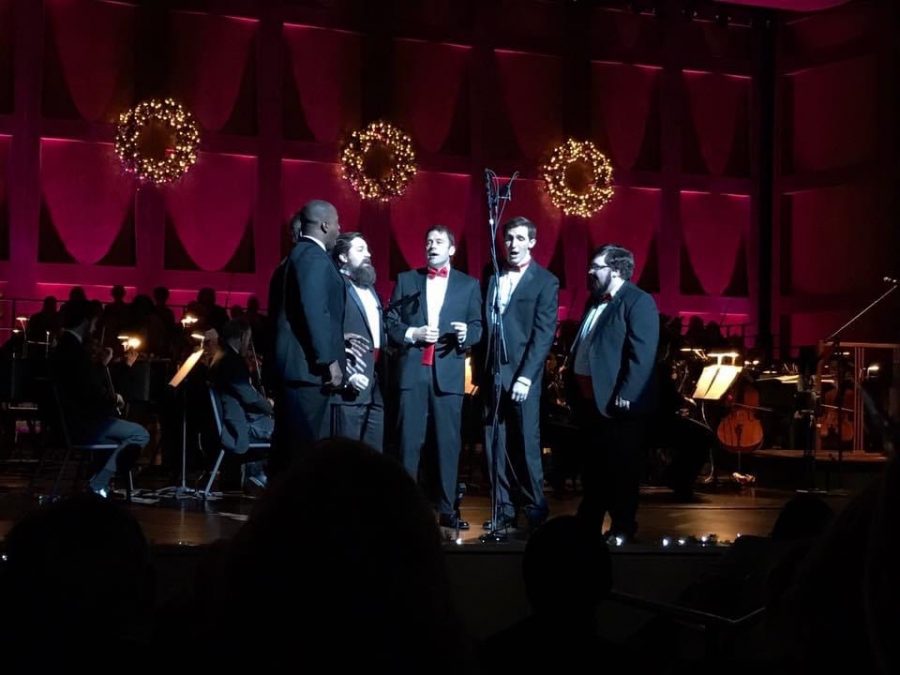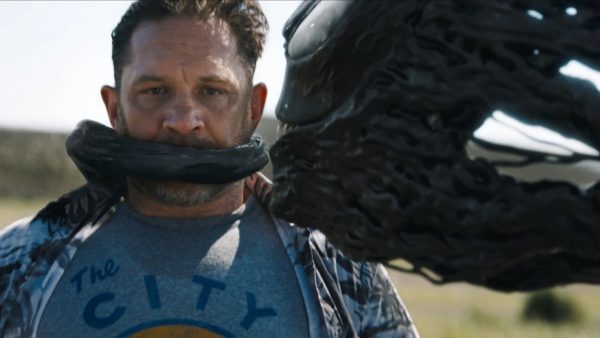The men behind our music
Joseph Powell, pictured far right, sings in a sextet in the Memphis Symphony Chorus for the Magic of Memphis Holiday Concert, with the conductor of the Symphony, Robert Moody, singing in the middle. They were singing “The Rose” as performed by Bette Midler.
When you are a musician, it’s impossible to not perform whenever, wherever and however possible. Brian Sims, Dr. Andrew Palmer, Joseph Powell and Daniel Massey have always been, and will never stop being musicians. Whether it was taking piano lessons, playing things by ear or joining Choir on a whim, each of these men knew that performing and teaching music meant something to them in adolescence.
Massey, one of White Station’s choir teachers, went to college to receive a performance major in guitar. One pivotal moment — a flag football game while attending Pearl River Community College — changed the course of his career forever.
“…I was kinda off balance, and I swatted [the ball] — my hand was numb, and I was like ‘Yeah! Let’s give a high five!…’ So it was my fret hand, I had dislocated [my knuckle] … I couldn’t play guitar,” Massey said.
After discussing it with his guitar teacher, Massey changed his degree after acknowledging his talent in singing.
Massey has many outlets and jobs outside of teaching: he is part of the Mobile Opera, Opera Memphis, Beale Conto, Moonlight, he caroled December of last year, he used to sing with the Memphis Symphony orchestra and similar to almost all the other Music teachers, he sings at his church.
“Then I sing at a church — at GSL Epsicopal,” Massey said. “During the early months of the pandemic, it was basically me, the two clergymen and the organist. We were just up there live-streaming every event in an empty church, and I was singing hymns by myself, and I realized how much pressure that is, and being very thankful that I didn’t mess up that much — enough to notice,” Massey said.
Since both his aunt and his grandmother were concert pianists, Sims was always fascinated by music, trying to play things he would hear on television and even try to write his own music.
“I had this weird, erroneous idea that I could take magazines … take the words and turn them into music … like literally take every letter and assign it a note or a value or something … [I] didn’t have any clue what I was doing …” Sims said.
Sims grew to be an experienced musician, playing on cruise ships for years before settling down to teach. Sims still plays outside of school at his church, in the Memphis Jazz Orchestra, in theatres, in a big band at the restaurant and venue Alfred’s and “whatever else” he got called for.
“Music is a great release,” Sims said. “No matter how tired or stressed I may be with school, or football games or any of that stuff, going to play a gig is so peaceful to me. Especially since … [in] all the gigs that I play, the people are so down to earth and such great people. It’s therapeutic. So yeah, I play. I play every chance I get,” Sims said.
Dr. Palmer came to Memphis to work on his doctorate, afterwards accepting an unexpected teaching opportunity in White Station’s orchestra program. In addition to teaching for 25 years, he enjoys playing in the Memphis Symphony Orchestra.
“People ask me … ‘Oh, have you figured out when you’re retiring?’ and I’m like, ‘No? Why? …’ and I am at really good schools, with really good principals and really good programs, and that makes a difference too, of course. White Station’s a great place with a great administration to work for. [There are] supportive and great kids, and I could see that if I didn’t enjoy it [I would have quit], but no,” Dr. Palmer said.
Similar to Dr. Palmer, Powell was hired as a White Station teacher right after college and has been there ever since. Powell not only is a choir director, but he is also part of Opera Memphis, a non-profit arts organization that produces operas. According to Powell, Opera Memphis is time consuming, but he could not imagine doing a single line of work.
“…I will say that there are times where I think to myself, ‘What if I did one or the other only, like solely?’, and I don’t think I could live like that. I don’t think I could be just a teacher. I also think I couldn’t be just a performer. I don’t think that’s a life I would want to live …” Powell said.
All starting as performance majors, it may seem that they compromised in their career for the stability of a teaching job. However, each teacher enforced that teaching is part of their purpose and is what they were meant to do in life.
“We had a room when I was in grade school that was designated specifically for kids with special needs, and it was one of my favorite things to go play music … hang out there and work with them. I don’t know why, it’s just the way I was. So, to me, teaching was like… there was something there about wanting to help people that … t just kinda went hand in hand,” Sims said.
Your donation will support the student journalists of White Station High School. Your contribution will allow us to purchase equipment and cover our annual website hosting costs.





































